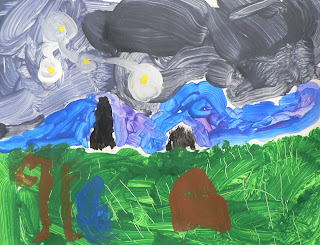Another shout to K12's history/art curriculum. By the way, MVCA is taking applications for 2013-2014 school year. :-) Here's the link. http://www.k12.com/mvca. This is for Michigan's online public school using the K12 curriculum. Many states have this online schooling option available. You can check your state at www.k12.com.
The 2nd graders have spent quite a bit of time learning about the Roman Empire in history. They learned that Rome started about 2700 years ago with a small group of villages. Then it grew into a huge empire. Then they learned about what caused the empire to split into the Eastern and Western Empires and they learned that the new more modern term "Byzantine Empire" represented the Eastern Roman Empire. Also, that the Emperor Justinian who caused the Eastern Empire to grow was a Christian, which brought us to some of the art work within the churches. :-)
Of course, there were many more details throughout those lessons. But what's really neat with the K12 curriculum is that often art and history are connected somehow. Not all the time, but often. And I love how they go back and make connections to past lessons because that's how children really learn...repetition! So in Art they are revisiting Ancient Rome. They are being reminded of all the beautiful architectural work, temples that were built to worship their gods/goddesses and all the amazing artwork and marble sculptures. They were reminded about the city of Pompeii which was buried over the course of 2-3 days when Mt. Vesuvius erupted. And they were shown a picture of a Roman bedroom that was preserved. The lesson title was called "No Window? No Problem!" :-D

The walls were frescoes (paintings directly on the plaster of the walls) and the floor was a marble mosaic. (I couldn't find the same picture as in the lesson. :-( They showed more of the floor.) The walls were painted with windows and scenes outside windows and from what I gather from the lesson, there wasn't an actual window in this room. All of them were painted! So the 2nd grade lesson was to paint a window and a scene outdoors.
They started with making a window sill and frame. The one on the left is very typical for that child, very detailed and the one on the right ... yep, that's typical too! He did a fictional scene. Seems to think that drawing realistic scenes are harder. :-D So he made a CandyLand scene out the window. Ha!
In a 3rd grade lesson, back in November, the children painted on plaster squares my husband made for them. That lesson was touching on frescoes also. Not exactly the same as painting on wet plaster but fun anyway!
Anyway, they moved onto some of the mosaics after talking about the floor of that room was a marble mosaic! That marble mosaic floor was 2000 years old. So we had a good conversation on whether carpet would last 2000 years. :-D
The mosaic below was one of the pictures also shared with the students. Remember that Emperor Justinian was Christian, he had many of the bible stories created in mosaics on the walls of churches. They did a good job and helping the children understand just how much marble would be needed and how much work it would be do create a mosaic like these.
Emperor Justinian and his Attendants
So after discussing mosaics for awhile all the students created a paper mosaic. They turned out well!
Yes, time consuming, but definitely neat outcomes. I see now in the picture that he should have used hot glue to glue his seaweed down. Seems that liquid glue didn't hold it down. We'll have to fix that. And no, that isn't part of a typical mosaic but I try to allow the children to follow their creative whims. So if the project turns out a little different than I expected, 'tis okay. :-)
1st grader really wasn't "into" this project as you can tell. :-) That's his sun. 2nd grader's umbrella, notice the little tiny piece of handle coming back up at the bottom of the page. Interesting! And he added darker blue for rain.
2nd grader's carrots.
Preschooler's sun on the left and 3rd grader's heart on the right.





























